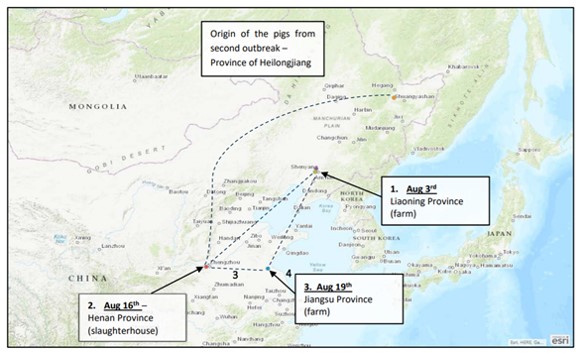



China’s pig herd suffers third ASF outbreak
The ASF death toll rises further as 88 pigs die on one farm in the Haizhou District, Lianyungang city, and a further 615 are confirmed to be infected with the African swine fever virusChina’s third ASF outbreak comes in quick succession after the second outbreak was confirmed only four days ago (16 August 2018). The Ministry of Agriculture and Rural Affairs have launched their ASF contingency protocol and have commenced emergency procedures. The government have also deployed teams to aid with implementing strict movement and trade blockades; disinfection; slaughter and disposal of animals; and collection of contaminated materials.
The Swine Health Information Centre (SHIC) issued the following statement in their swine disease global surveillance report:
“The three cases are reported in three provinces – and a fourth northern province related to the second event – providing pigs that were infected by delivery to the plant in Zhengzhou.”

Distances by road from different points: 1: = 870 miles (1,400 km); 2= 1,400 miles (2,253 km); 3: 350 miles (563 km); 4: 800 miles (1,288 km). Image: Swine Health Information Centre
“Pigs in China are reared across a wide range of farms, including units that are similar to modern US production systems. However, much of the pork consumed is still from small household units that are fed the food scraps of a family or neighbourhood. Likewise, the slaughter and sale of pigs is often through modern slaughter facilities and supermarkets, but much of the pork is sold without refrigeration, with local slaughter and sales from neighbourhood vendors.
“The swine industry has never seen an ASF outbreak in such a production landscape, and control measures are untested. The Chinese industry has had difficulties in controlling Foot-and-mouth disease and Classical swine fever, and has relied heavily on the use of vaccines. As a vaccine is not available for ASF, the industry is thus reliant on heightened biosecurity, rapid diagnosis, complete isolation, and then elimination of infected pigs and contaminated materials.”
Source: Swine Health Information Centre









